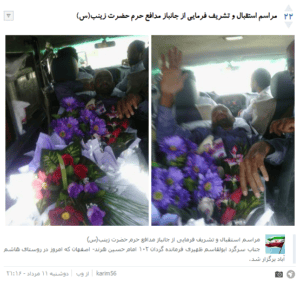
Part of welcoming ceremony for wounded IRGC Major Abolghassem Zahiri, as posted on pro-IRGC online circles.
The jihadist-led Jaish al Fatah launched a major offensive in southwestern Aleppo on July 31 to break the siege of the rebel-held part of the city. The offensive comes after the last supply route north of Aleppo was severed on July 28 by pro-regime forces encompassing the Syrian Arab Army, Shia militias backed by Iran’s Islamic Revolutionary Guard Corps (IRGC), and the US-backed Kurdish People’s Defense Units (YPG). Iran has acknowledged casualties corresponding with the uptick in battles.
During the latest offensive in southwestern Aleppo, officials have thus far announced the deaths of five Iranian soldiers. Statements say fighters are killed in Aleppo by “takfiri terrorists” (A “takfiri” is a Muslim who accuses another Muslim of apostasy. The Iranian regime uses this label for all Sunni rebels and opposition, not just jihadists). Iranian officials continue to say that combatants are killed during their missions.
The death of an IRGC Basij medic was announced on Aug. 3. An IRGC commander on the same day announced the death of a commander in the Afghan Fatemiyoun Division. Officials announced the death of a veteran of the Iran-Iraq War from Ardebil who was a member of the IRGC paramilitary Basij on Aug. 1. Social media posts on pro-IRGC online circles reportedly show a welcoming ceremony held on Aug. 1 for a wounded IRGC major who commands the 102nd Imam Hossein Battalion of Harand in Isfahan province. A member of the IRGC’s Alborz province unit was killed on July 31, and his death announced the following day.
Army Third Lieutenant Mohammad Moradi was also killed in Aleppo on August 1. There has been heavy fighting for control of the Aleppo Artillery School southwest of the city. Prior to deploying to Syria, Moradi had served in the 22nd Artillery Group of Shahreza County in Isfahan province. The death of the Iranian Army artillery officer suggests that elements of the regular Army continue rotating into Syria as part of the IRGC-led expeditionary force. Army commanders publicly confirmed in April the deployment of special forces, following weeks of hints and announcements offering their services for the Islamic Republic in Syria. Special forces were defeated in one of their first major battles in Aleppo at the hands of the battle-hardened Jabhat al Nusrah, al Qaeda’s Syrian branch, which is now called Jabhat al Fatah al Sham. Iran has acknowledged the deaths of seven Army commandos, all in April.
With the backing of Russian airpower, the IRGC, Iranian-backed militias, and allies succeeded in encircling Aleppo last week. In early July, pro-regime forces launched the operation to link forces from the north and west of the city at Castello Road, the last rebel supply route to the city. The Guard confirmed five fatalities during the course of the operation, including two majors on July 13. At least 42 Afghan and Pakistani militiamen were killed last month, with dozens killed before July 21. Syrian Arab Army, YPG, and Russia dealt the finishing blows last week, completing the encirclement of Aleppo..
The Guard was furthermore instrumental in laying the groundwork of Aleppo’s siege in February, cutting off rebel supply route to Turkey with the assistance of YPG, Russia, and Iranian-backed militias including Lebanese Hezbollah, Iraqi Shia militias, the Afghan Fatemiyoun Division, and Syrian National Defense Forces. The IRGC put far more of its own ground forces in that operation, losing more than 40 soldiers including brigadier generals.
The IRGC prefers to rely on foreign proxies as foot soldiers in Syria with Guard officers advising and leading operations, though the top command has not hesitated to inject its own regular ground forces if necessary.
Iran’s military involvement in Aleppo underscores the strategic importance of the city to Tehran. The potential success of Jaish al Fatah in breaking the city’s siege would be a setback, but Iran and its allies are committed to victory in Aleppo, or at least achieving a political solution through military means.







